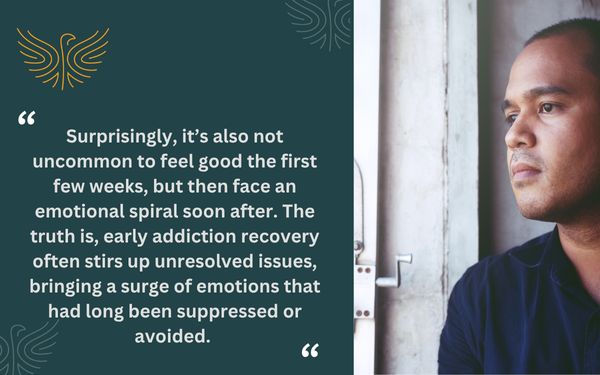Early recovery is, unfortunately, often paved with pitfalls and temptations. While you’ve made the courageous step to go to rehab, you may be feeling worse—before you feel better. So, why does a decision that’s supposed to feel good potentially feel so heavy?
Surprisingly, it’s also not uncommon to feel good the first few weeks, but then face an emotional spiral soon after. The truth is, early addiction recovery often stirs up unresolved issues, bringing a surge of emotions that had long been suppressed or avoided. Addiction also didn’t happen overnight, meaning the brain needs time to gradually adjust, heal, and relearn how to function without the substance.

At Freedom Recovery Centers (FRC), our team is here to support you every step of the way, including through those early days. In this article, we take a closer look at why many feel worse before they feel better and what you can do to continue taking steps forward toward lasting healing.
_______________________________________________________
Why Do I Feel Worse Before Getting Better?
Ultimately, feeling worse is completely normal and very common. It doesn’t mean rehab isn’t working. Usually, there are also two main reasons for this downward turn of emotions.
1. Your brain is adjusting.
When you stop using substances, your brain begins a complex process of recalibration that can initially feel overwhelming. For months or years, your brain has relied on external chemicals to regulate mood, sleep, appetite, and emotional responses. Now, without those substances, your brain’s natural chemistry is working to restore balance—but this process takes time.
During early recovery, it’s, thus, only natural for your emotions to fluctuate. This is because your brain’s reward system, once conditioned to the intense highs of substance use, now has trouble finding satisfaction in everyday activities. As a result, you may experience depression, anxiety, irritability, or a general sense of numbness. Sleep can become disrupted, leaving you feeling restless or unexpectedly fatigued throughout the day.
Here’s the good news: These neurochemical changes are actually signs that healing has started and is on track. Your brain is rewiring itself, creating new neural pathways and strengthening connections that support healthy functioning. These symptoms are also temporary. Many begin to notice improvements after a few weeks, alongside therapeutic support provided in rehab.
2. Your past may be catching up with you emotionally.
Substances often act as a shield against difficult emotions, traumatic memories, and unresolved pain. Once that barrier is removed, those suppressed feelings can resurface with unexpected intensity. As difficult as this may be, it’s an essential part of the healing process.
These feelings might arise from grief over lost relationships, guilt about past actions, shame tied to choices made while using, or deeper unresolved traumas that may have contributed to substance use in the first place. Without the familiar coping mechanism of substances, these emotions can initially feel intense.
On top of this, you may be confronting the reality of how addiction impacts your relationships with loved ones, your career goals, health, and more. It’s common to experience a range of emotions due to these repercussions, including sadness, regret, and even anger.
But while these emotions may feel overwhelming, they’re a sign of progress. By facing them head-on, you’re building the resilience and coping skills needed for long-term recovery. Therapy and support can help you process what’s coming up, heal from the past, and lay a foundation for lasting change.
And remember, you don’t have to do it alone—your treatment team and support network are here to help. At FRC, we’re committed to helping you forge a new path forward—one where substances no longer define your life, and healing, growth, and connection take their place.
_______________________________________________________
How To Start Feeling Better
It’s worth noting that the goal of recovery isn’t necessarily to feel good all the time. Instead, it’s about learning to feel everything—both the good and the difficult—without needing to escape it. With time, support, and therapeutic interventions, all of this also becomes easier.
At the same time, there are ways you can move through and overcome these negative feelings. Throughout rehab and recovery, you’ll learn to accept negative emotions, learn healthy coping mechanisms, and understand that recovery and sobriety are always about taking it one day at a time.
Recovery teaches us that we don't need to live in emotional extremes. Some days don’t have to be “great” or “horrible”—they can simply be okay, and that’s perfectly acceptable. Learning to find peace in the middle ground is a valuable skill that will serve you throughout your recovery journey.
Cognitive Behavioral Therapy (CBT) and other proven therapies can also help you recognize and change negative thought patterns that fuel emotional pain. You’ll learn practical ways to handle stress and respond more calmly to triggers. Group therapy also offers a powerful sense of connection, showing you that you’re not alone—and that others really do understand what you’re facing.
At the end of the day, every small step is worth celebrating. Additionally, some other ways you can continue to feel better and support your recovery include:
- Establishing a daily routine (which rehab can often help guide initially!)
- Practicing relaxation and mindfulness techniques
- Staying physically active and focusing on improving your physical health
- Setting small, achievable goals
- Practicing self-compassion
Ready to begin your journey toward a substance-free life? Recovery is possible, and our team is here to guide you. Call us at 804-635-3746 or fill out our online form. We answer our phones 24/7 and are available when you’re ready.
.svg)






.svg)

.svg)



.svg)
